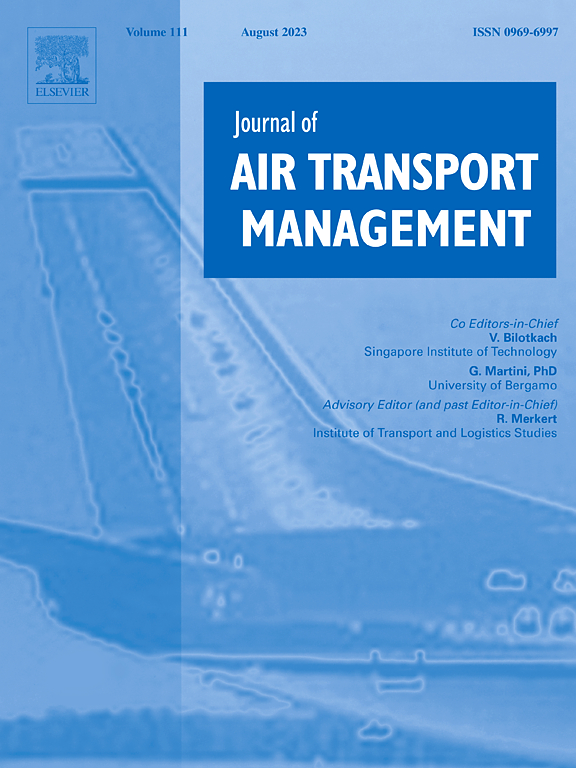Examining airport agility at air cargo hub airports
IF 3.9
2区 工程技术
Q2 TRANSPORTATION
引用次数: 0
Abstract
The Covid-19 pandemic impacted nearly every aspect of airport operations, highlighting the importance of airport agility. Due to its importance, it is crutial for us to understand the role of agility at airports prior to and during unexpected disruptions. We investigated airport agility for air cargo hub airports using a structural equation model, particularly at Incheon International Airport (ICN). This study uses 27 variables to evaluate the agility of the air cargo business for a hub airport. We find that digital transformation, flight services, information sharing, and accessibility enhance the agility of air cargo hub airports. The survey shows that air cargo experts perceive ICN airport as having satisfactory agile response capabilities. Agility is essential to resilience, which will deliver a competitive advantage and aid the long-term prosperity of the air cargo business. Airports must collaborate to share, align, and improve their collective resilience to improve the productivity and performance of air cargo hubs. Developing innovative airport models enabled by new technologies, such as digital transformation, increases the efficiency and agility of the airport. The ICN's strategy as an air cargo hub airport is responsive to customer needs to mitigate disruptions through digitalization, offering value-added services with adaptability. The application of digitalization improves the airport's agility and efficiency and mitigates uncertainty in the air cargo industry.
考察航空货运枢纽机场的灵活性
Covid-19 大流行几乎影响了机场运营的方方面面,凸显了机场灵活性的重要性。鉴于其重要性,我们有必要了解机场敏捷性在意外中断之前和期间的作用。我们使用结构方程模型研究了航空货运枢纽机场的机场敏捷性,尤其是仁川国际机场(ICN)。本研究使用 27 个变量来评估枢纽机场航空货运业务的敏捷性。我们发现,数字化转型、航班服务、信息共享和可及性提高了航空货运枢纽机场的敏捷性。调查显示,航空货运专家认为 ICN 机场的敏捷反应能力令人满意。敏捷性对应变能力至关重要,它将带来竞争优势,并有助于航空货运业务的长期繁荣。机场必须开展合作,共享、调整和提高集体应变能力,以提高航空货运枢纽的生产力和绩效。通过新技术(如数字化转型)开发创新机场模式,提高机场的效率和灵活性。ICN 作为航空货运枢纽机场的战略是响应客户需求,通过数字化缓解干扰,提供适应性强的增值服务。数字化的应用提高了机场的灵活性和效率,减少了航空货运业的不确定性。
本文章由计算机程序翻译,如有差异,请以英文原文为准。
求助全文
约1分钟内获得全文
求助全文
来源期刊

Journal of Air Transport Management
TRANSPORTATION-
CiteScore
12.40
自引率
11.70%
发文量
97
期刊介绍:
The Journal of Air Transport Management (JATM) sets out to address, through high quality research articles and authoritative commentary, the major economic, management and policy issues facing the air transport industry today. It offers practitioners and academics an international and dynamic forum for analysis and discussion of these issues, linking research and practice and stimulating interaction between the two. The refereed papers in the journal cover all the major sectors of the industry (airlines, airports, air traffic management) as well as related areas such as tourism management and logistics. Papers are blind reviewed, normally by two referees, chosen for their specialist knowledge. The journal provides independent, original and rigorous analysis in the areas of: • Policy, regulation and law • Strategy • Operations • Marketing • Economics and finance • Sustainability
 求助内容:
求助内容: 应助结果提醒方式:
应助结果提醒方式:


